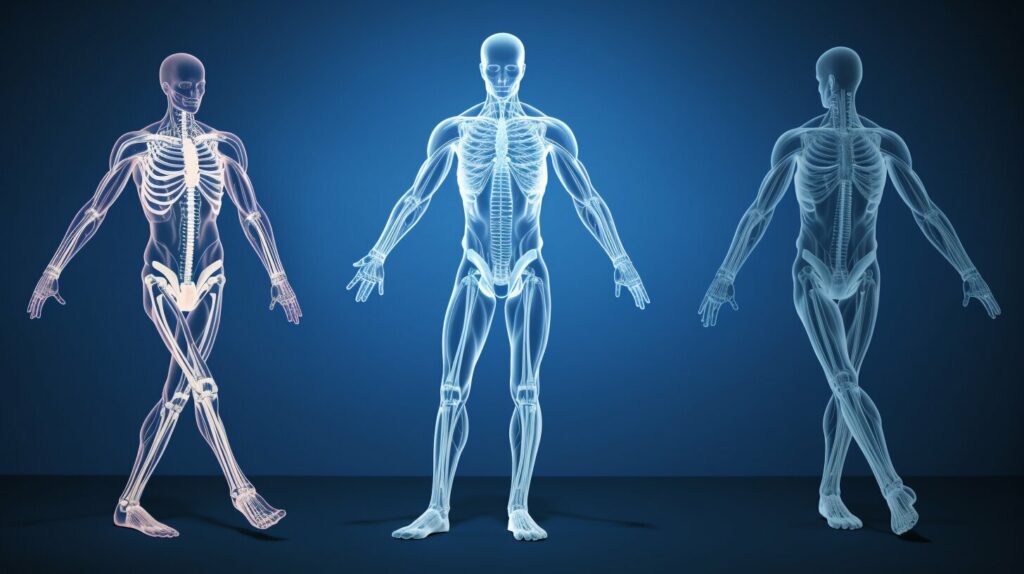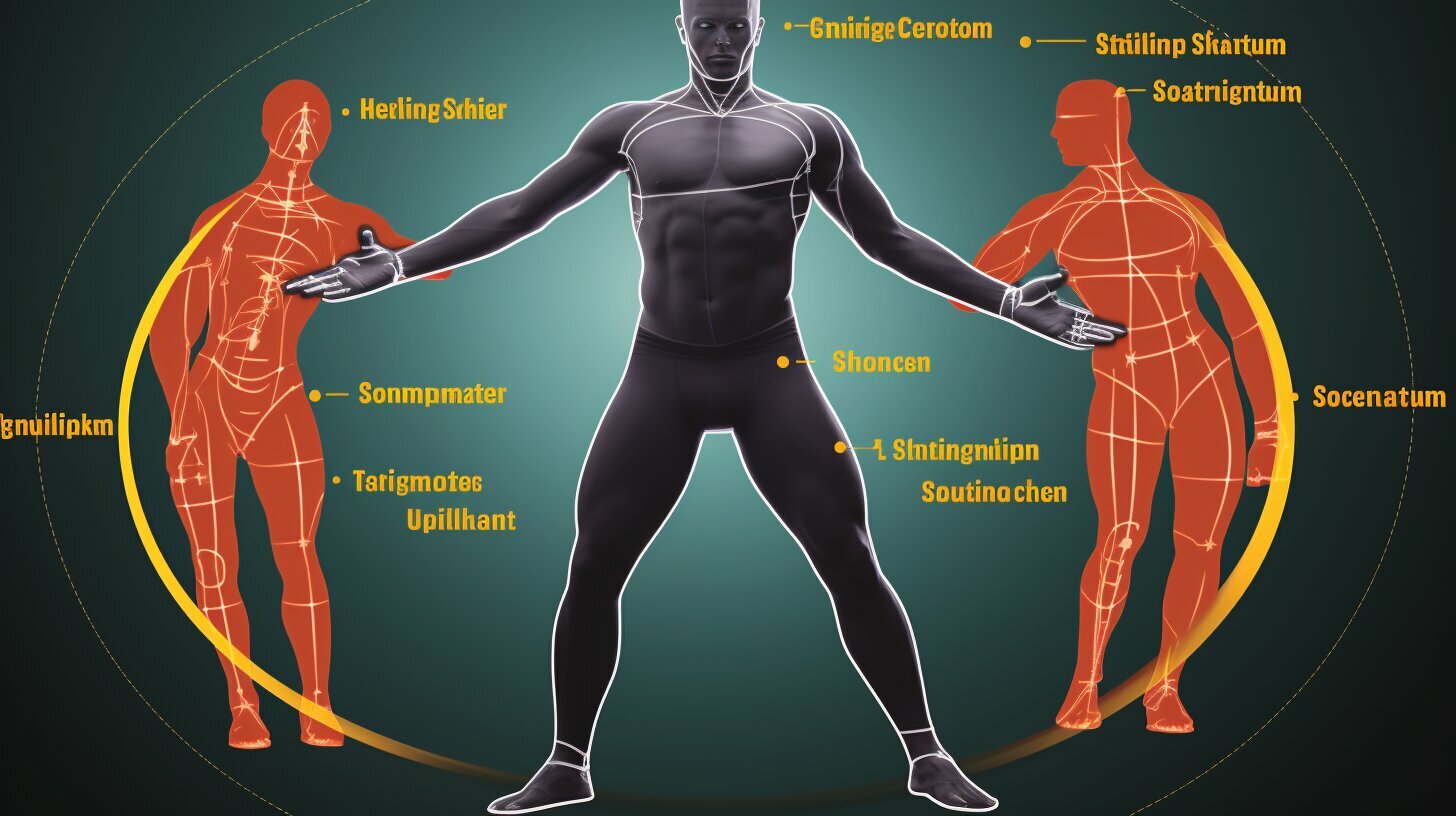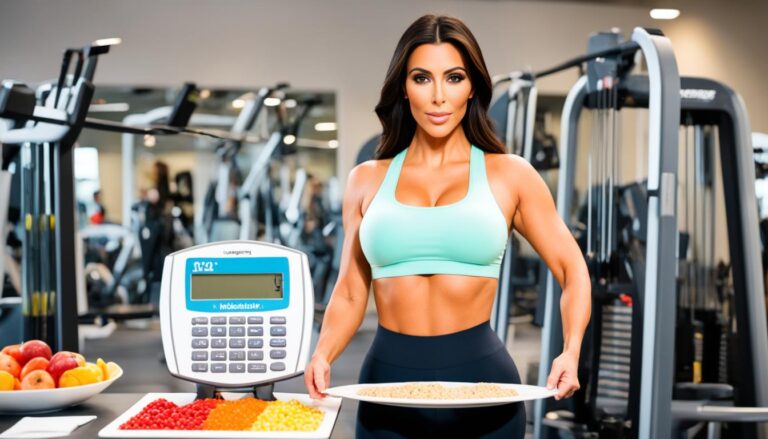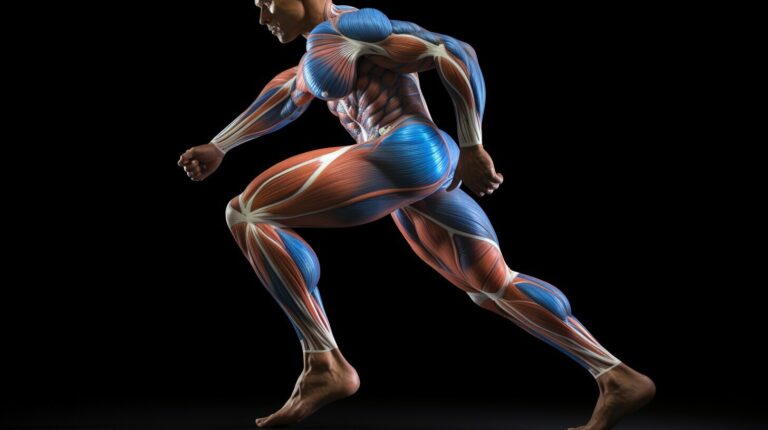Can Mesomorphs Be Chubby?
When it comes to body types, mesomorphs are often associated with being fit and muscular. But can mesomorphs still be chubby? Let’s explore the relationship between mesomorph body type, body composition, weight gain, and muscle mass.
Key Takeaways:
- Mesomorphs have a medium frame, muscular build, and a natural tendency to stay fit.
- They can still gain excess body fat if they are sedentary or consume a caloric surplus.
- Weight gain for mesomorphs is generally distributed evenly throughout the body.
- With the right diet and exercise plan, mesomorphs can lose weight easily.
- Mesomorphs respond well to a well-balanced diet with relatively equal parts protein, carbohydrates, and fats.
What Is a Mesomorph Body Type?
A mesomorph body type is often regarded as the ideal body type due to its unique characteristics. Mesomorphs typically have wide shoulders, a narrow waist, and a naturally athletic physique. Their bodies are well-proportioned, with a medium frame and smaller joints. Mesomorphs also tend to have round muscle bellies, allowing them to develop muscles more easily than other body types.
This body type is often associated with natural athleticism and strength. Mesomorphs have a higher muscle mass and a lower body fat percentage, giving them a more defined and sculpted appearance. Their bodies respond well to exercise and weight training, making it easier for them to build and maintain muscle.
Overall, mesomorphs have a body type that is considered aesthetically pleasing and desirable. They have the potential to achieve a balanced body composition and a toned physique with the right diet and exercise routine.
| Characteristics | Description |
|---|---|
| Wide Shoulders | Mesomorphs have broad shoulders, which contribute to their athletic appearance. |
| Narrow Waist | Their waistline is typically narrower compared to other body types, further enhancing their symmetrical physique. |
| Natural Athleticism | Mesomorphs possess natural athleticism, making it easier for them to engage in physical activities and sports. |
| Medium Frame | Their body frame falls between ectomorphs (slim) and endomorphs (round), giving them a balanced appearance. |
Can Mesomorphs Be Overweight?
Mesomorphs, with their naturally muscular build and balanced body composition, are typically not considered overweight. However, it is important to understand that mesomorphs can still gain excess body fat if they lead a sedentary lifestyle or consume more calories than they burn. While genetics play a role in body composition, lifestyle factors such as diet, exercise, and overall health also contribute to weight gain or loss. Therefore, mesomorphs can indeed be overweight if they do not maintain a healthy lifestyle and watch their calorie intake.
It is crucial to debunk the misconception that mesomorphs are immune to weight gain. Genetics may give them an advantage in terms of muscle development and a well-proportioned physique, but it does not exempt them from the basic principles of energy balance. Mesomorphs need to prioritize regular physical activity and consume a balanced diet to prevent excessive weight gain and promote overall health.
When it comes to body composition and weight management, it is important to consider both genetic factors and lifestyle choices. Mesomorphs can achieve their desired body weight and composition by adopting healthy habits, including regular exercise and a nutritious diet that supports their individual needs. While mesomorphs may have certain advantages genetically, it is their lifestyle factors that ultimately determine their weight and overall health.
| Factors Contributing to Mesomorph Weight | What Can Be Done |
|---|---|
| Genetics and body composition | Maintain a healthy lifestyle with regular exercise and a balanced diet |
| Lifestyle choices | Engage in physical activity, monitor calorie intake, and make nutritious food choices |
| Sedentary behavior | Incorporate regular physical activity and avoid prolonged periods of sitting |
| Caloric surplus | Ensure a healthy calorie balance by consuming an appropriate amount of calories for energy expenditure |
By recognizing the impact of genetics and lifestyle factors, mesomorphs can take control of their weight and overall health. Incorporating regular physical activity, maintaining a balanced diet, and adopting a holistic approach to wellness can help mesomorphs achieve their desired body composition and lead a healthy, fulfilling life.
Ideal Diet Plan for Mesomorphs
When it comes to maintaining a healthy body composition, diet plays a crucial role for mesomorphs. A well-balanced diet that focuses on the right macronutrient breakdown can support muscle growth and help maintain a healthy weight. For mesomorphs, it is important to find the right balance of protein, carbohydrates, and fats in their diet.
The Macronutrient Breakdown
Mesomorphs generally respond well to a diet that consists of equal parts protein, carbohydrates, and fats. Protein is especially important for mesomorphs as it supports muscle growth and repair. Aim to include lean sources of protein such as chicken, fish, tofu, and legumes in your diet.
Carbohydrates provide energy and fuel for workouts, so it is essential to include complex carbohydrates like whole grains, fruits, and vegetables. These carbohydrates also provide important vitamins, minerals, and fiber necessary for overall health.
Fats are an essential part of a mesomorph’s diet as they support hormone production and help with nutrient absorption. Opt for healthy fats such as avocados, nuts, seeds, and olive oil.
| Macronutrient | Recommended Daily Intake | Food Sources |
|---|---|---|
| Protein | 0.8-1 gram per pound of body weight | Chicken, fish, tofu, legumes |
| Carbohydrates | 45-65% of total daily calories | Whole grains, fruits, vegetables |
| Fats | 20-35% of total daily calories | Avocados, nuts, seeds, olive oil |
“A well-balanced diet with equal parts protein, carbohydrates, and fats is essential for supporting muscle growth and maintaining a healthy weight for mesomorphs.”
Calorie Intake and Portion Control
While mesomorphs have a natural tendency to build muscle and maintain a healthy weight, it is still important to watch calorie intake. Consuming excess calories can lead to weight gain, even for mesomorphs. It is crucial to maintain a calorie balance that aligns with your fitness goals.
Portion control is key for mesomorphs to prevent overeating. Pay attention to portion sizes and listen to your body’s hunger and fullness cues. Eating mindfully and slowly can help you gauge when you are satisfied.
Remember that individual calorie needs may vary based on activity level, metabolism, and goals. It may be helpful to consult with a registered dietitian or nutritionist to determine the appropriate calorie intake for your specific needs.
In conclusion, mesomorphs can benefit from a well-balanced diet that includes the right macronutrient breakdown and portion control. By nourishing your body with the right foods and maintaining a healthy calorie intake, mesomorphs can support muscle growth, maintain a healthy weight, and optimize overall health.

Exercise Recommendations for Mesomorphs
Mesomorphs, with their naturally athletic build and higher muscle mass, can benefit from a well-rounded exercise routine that combines weight training and cardio exercises. Weight training is essential for mesomorphs to maintain and enhance their muscle tone and strength. Incorporating exercises such as squats, deadlifts, bench presses, and rows can help mesomorphs build and sculpt their muscles effectively. Remember to gradually increase the weights and vary the exercises to prevent plateaus and keep the workouts challenging.
In addition to weight training, cardio exercises play a crucial role in supporting overall health and boosting metabolism for mesomorphs. High-intensity interval training (HIIT) is particularly effective in burning calories and improving cardiovascular fitness. HIIT involves alternating between short bursts of intense exercise and active recovery periods. Mesomorphs can benefit from HIIT sessions that include exercises like sprints, burpees, jump squats, and mountain climbers. It’s important to start with a warm-up and gradually increase the intensity and duration of the intervals.
Alongside weight training and HIIT, mesomorphs can also engage in other forms of cardiovascular exercise to maintain a well-rounded fitness routine. Activities like jogging, swimming, cycling, and hiking provide additional cardiovascular benefits and can be enjoyable ways to stay active. Remember to listen to your body and incorporate rest days into your exercise schedule to allow for proper recovery and prevent overtraining.
Sample Workout Routine for Mesomorphs:
| Day | Exercise | Sets | Reps |
|---|---|---|---|
| Monday | Squats | 4 | 8-10 |
| Bench Press | 4 | 8-10 | |
| Lat Pulldowns | 3 | 10-12 | |
| Tuesday | HIIT Workout | – | – |
| Wednesday | Rest Day | – | – |
| Thursday | Deadlifts | 4 | 6-8 |
| Shoulder Press | 3 | 10-12 | |
| Dumbbell Lunges | 3 | 10-12 | |
| Friday | Sprints | – | – |
| Saturday | Rest Day | – | – |
| Sunday | Active Recovery | – | – |
Note: This is just an example of a workout routine for mesomorphs. It’s important to consult with a fitness professional to create a personalized plan that suits your specific goals and needs.

Determining if You Are a Mesomorph
To determine if you have a mesomorph body type, it’s essential to consider certain body characteristics and weight distribution. Mesomorphs typically have a muscular and athletic structure, with wide shoulders and even weight distribution throughout their bodies. They tend to gain weight and build muscle easily, but maintaining calorie control is crucial to avoid excess weight gain.
Identifying your body type can sometimes be challenging, especially if you experience rapid weight changes. However, there are a few indicators that can help you determine if you have a mesomorph body type. If you naturally have a medium build with well-defined muscles, broad shoulders, and a narrow waist, you are likely a mesomorph. It’s important to understand that body types are not strict classifications, and individuals can display characteristics from different body types.
If you’re unsure about your body type, you can take a body type quiz or consult with a professional, such as a trainer or nutritionist, who can assess your body composition and provide personalized guidance. They can help you understand your unique body characteristics and develop a plan that aligns with your health and fitness goals.
| Body Characteristics | Weight Distribution | Diet and Exercise Recommendations |
|---|---|---|
| Muscular and athletic structure | Even weight distribution throughout the body | Focus on maintaining calorie control to avoid excess weight gain |
| Wide shoulders | ||
| Narrow waist |
Recognizing your body type, such as being a mesomorph, can provide valuable insights into how your body responds to diet and exercise. However, it’s important to remember that everyone’s journey is unique, and individual factors, such as genetics and lifestyle choices, also play a significant role in overall health and fitness.
Debunking Common Myths about Mesomorphs
Despite the popularity of discussing mesomorph body types, there are several common myths surrounding them. It’s important to address these misconceptions to provide a more accurate understanding of nutrition and exercise for mesomorphs. One prevalent myth is that mesomorphs can eat whatever they want without consequences. While they may have a higher muscle mass and a natural ability to lose weight, this doesn’t mean they can disregard their calorie intake. Like anyone else, mesomorphs need to maintain a healthy balance of nutrients and watch their calorie intake to avoid weight gain and promote overall health.
“Mesomorphs can eat anything and still stay fit.” – This is a common misconception that overlooks the importance of nutrition for any body type. While mesomorphs may have certain genetic advantages, a healthy diet is vital for supporting their athletic abilities and maintaining optimal health.
Another myth is that exercise is not necessary for mesomorphs to maintain a healthy physique. Regular physical activity is essential for everyone, regardless of body type. Exercise helps to improve cardiovascular health, strengthen muscles, and support overall well-being. Mesomorphs, just like any other body type, benefit from a combination of weight training, cardiovascular exercise, and other physical activities that they enjoy. It’s important to focus on a well-rounded exercise routine that supports overall fitness and personal goals.
It’s crucial to remember that each individual is unique, and making assumptions based solely on appearance can lead to misunderstandings and unfair judgments. Mesomorphs, like anyone else, have their own preferences, work ethic, and exercise routines that may differ from others. It’s important to celebrate and respect these differences and focus on personalized approaches to nutrition and exercise that align with the individual’s goals and values.
| Common Myths About Mesomorphs | Truth |
|---|---|
| Mesomorphs can eat whatever they want without consequences. | Mesomorphs still need to maintain a healthy calorie balance and watch their nutrient intake. |
| Mesomorphs don’t need to exercise to stay healthy. | Regular exercise is crucial for mesomorphs’ overall health and well-being. |
| All mesomorphs have the same work ethic and exercise preferences. | Each mesomorph is unique, with their own preferences and exercise routines. |

The Importance of Understanding Misconceptions
Addressing these common myths about mesomorphs is essential to promote a more accurate and inclusive understanding of body types. By debunking misconceptions and focusing on individualized approaches to nutrition and exercise, we can create a more supportive and empowering environment for individuals of all body types to achieve their health and fitness goals.
Understanding Somatotypes and Body Types
The concept of somatotypes categorizes individuals into three main body types: ectomorph, mesomorph, and endomorph. These categories are based on a combination of skeletal frame size and body composition. Ectomorphs are characterized by a slim body frame and difficulty gaining weight and muscle mass. Endomorphs have a larger, rounder body shape and are more prone to weight gain. Mesomorphs fall between these two types, with a medium build and a higher muscle mass. It’s important to note that these body types are not strict classifications, and many individuals display a combination of characteristics from different body types.
The Three Main Somatotypes
1. Ectomorph: Ectomorphs tend to have a small frame, narrow shoulders, and a lean appearance. They have a faster metabolism, making it difficult for them to gain weight or build muscle mass. Ectomorphs often have to consume more calories and follow a specific exercise regimen to support muscle growth.
2. Mesomorph: Mesomorphs have a medium build with wider shoulders, a narrow waist, and a naturally muscular figure. They have a balanced metabolism and can gain muscle mass relatively easily. Mesomorphs are often seen as the “ideal” body type, as they have a symmetrical appearance and are naturally athletic.
3. Endomorph: Endomorphs have a larger frame with a higher body fat percentage. They typically have rounder bodies, wider hips, and a slower metabolism, making it easier for them to gain weight. Endomorphs may struggle with losing body fat and need to focus on a balanced diet and regular exercise to maintain a healthy body composition.
While somatotypes provide a general framework for understanding body types, it’s important to remember that each individual is unique. Genetics, lifestyle factors, and personal preferences all play a role in how our bodies look and respond to diet and exercise. It’s essential to take an individualized approach when it comes to fitness and nutrition, tailoring programs and recommendations to fit the specific needs and goals of each person.
| Somatotype | Characteristics | Diet and Exercise Considerations |
|---|---|---|
| Ectomorph | – Slim body frame – Narrow shoulders – Lean appearance |
– Higher calorie intake – Focus on strength training to build muscle mass |
| Mesomorph | – Medium build – Wider shoulders – Naturally muscular |
– Balanced calorie intake – Combination of strength training and cardio – Maintain overall fitness |
| Endomorph | – Larger frame – Higher body fat percentage – Rounder body shape |
– Moderate calorie intake – Emphasis on regular exercise – Focus on reducing body fat |
The Controversy Surrounding Body Types
The concept of somatotypes categorizes individuals into different body types, including ectomorphs, mesomorphs, and endomorphs. While somatotypes have been widely discussed in the health and fitness industry, there is ongoing controversy surrounding their accuracy and the assumptions made based on body types.
Many misconceptions and biases surround body types, leading to generalizations and stereotypes. One common misconception is that mesomorphs are inherently more athletic and have an easier time achieving their fitness goals. This assumption can create unfair expectations and overlook individual differences in genetics, lifestyle, and personal choices.
It’s important to recognize that body types do not determine a person’s work ethic, discipline, or health outcomes. Each individual is unique, and their goals, preferences, and abilities should be considered on an individual basis. Personalized coaching and programming that focus on the individual’s needs and capabilities are far more effective than relying solely on body types to make decisions about diet and exercise.
“It’s important to recognize that body types do not determine a person’s work ethic, discipline, or health outcomes.”
The Impact of Misconceptions and Biases
The perpetuation of misconceptions and biases surrounding body types can have negative effects on individuals’ self-esteem and body image. When certain body types are idealized or stigmatized, it can lead to feelings of inadequacy and the development of unhealthy relationships with food and exercise.
To promote a more inclusive and balanced approach to health and fitness, it’s crucial to challenge these assumptions and encourage a focus on overall well-being rather than appearance alone. Emphasizing the importance of individualized approaches, body positivity, and self-acceptance can help create a more supportive and empowering environment for everyone.

Table: Comparing Common Misconceptions and Realities of Body Types
| Misconception | Reality |
|---|---|
| Mesomorphs are naturally fit and athletic. | Mesomorphs still need to maintain a healthy lifestyle and make conscious choices for their well-being. |
| Ectomorphs are weak and lack muscle. | Ectomorphs can build strength and muscle with proper training and nutrition. |
| Endomorphs are lazy and lack self-control. | Endomorphs can achieve their health goals through dedication and a balanced lifestyle. |
| Body type determines work ethic and discipline. | Work ethic and discipline are personal qualities that are not determined by body type. |
By challenging misconceptions, biases, and stereotypes surrounding body types, we can foster a more inclusive and supportive environment for individuals of all shapes and sizes. Embracing an individualized approach to health and fitness empowers individuals to focus on their own unique journey and encourages a positive relationship with their bodies, free from the constraints of societal norms.
The Importance of Individualized Approaches
When it comes to achieving health and fitness goals, taking an individualized approach is key. Each person has unique goals, values, and preferences that should guide their journey towards a healthier lifestyle. Rather than relying solely on generic body type classifications, such as mesomorphs, it’s important to consider the specific needs and circumstances of each individual.
Behavior change and long-term success are best achieved through personalized coaching and support. By working closely with a coach or professional, individuals can create tailored plans that align with their goals, values, and preferences. This individualized approach takes into account factors such as lifestyle, schedule, dietary restrictions, and personal preferences.
“The beauty of an individualized approach is that it allows us to create a plan that is not only effective but also sustainable. It takes into consideration the unique needs and circumstances of each individual, empowering them to make meaningful and lasting changes,” says personal coach Julia Smith.
By focusing on an individual’s goals and values, the coaching process becomes more personalized and effective. Through regular communication, accountability, and support, individuals can navigate the challenges of behavior change and stay motivated along their journey. This personalized approach helps individuals not only achieve their health and fitness goals but also develop a deeper understanding of their own capabilities and strengths.
Benefits of an Individualized Approach:
- Customized plans that align with personal goals and values.
- Support and accountability from a coach or professional.
- Flexibility to accommodate individual preferences and dietary restrictions.
- Greater understanding of one’s own capabilities and strengths.
| Individualized Approach | Generic Approach |
|---|---|
| Customized plans that address specific needs and goals. | One-size-fits-all approach that may not consider individual circumstances. |
| Focuses on sustainable behavior change for long-term success. | Relies on short-term fixes that may not lead to lasting results. |
| Supports personal growth, self-awareness, and empowerment. | May lead to feelings of frustration or failure if goals are not met. |
An individualized approach to health and fitness allows for a more holistic and sustainable journey. It recognizes that each person is unique and that their goals and values should guide their path. By working closely with a coach or professional, individuals can create personalized plans that support behavior change and lead to long-term success.

The Role of Genetics and Lifestyle Factors
When it comes to body composition and overall health, both genetics and lifestyle factors play a significant role. While genetics may contribute to certain body characteristics, such as predispositions for muscle development or fat storage, it’s important to remember that lifestyle choices also have a profound impact. Having a mesomorph body type, which is characterized by a medium build and higher muscle mass, is not a guarantee of optimal health or fitness.
Diet and exercise play a crucial role in determining body composition, regardless of genetics. A well-balanced diet, focused on nutrient-dense foods, can help individuals maintain a healthy weight and support proper muscle development. It’s important to pay attention to calorie intake and ensure that it aligns with individual energy needs. Similarly, engaging in regular physical activity, including both resistance training and cardiovascular exercise, is essential for promoting overall health and maintaining a balanced body composition.
While genetics may influence an individual’s body type and how they respond to certain lifestyle factors, such as gaining muscle or losing fat, it’s crucial to remember that individual choices and behaviors can override genetic predispositions. By adopting healthy habits, such as following a nutritious diet and staying active, individuals can achieve optimal health and fitness outcomes, regardless of their genetic makeup. It’s the combination of genetics and lifestyle factors that ultimately shapes an individual’s body composition and overall well-being.
| Factors | Genetics | Lifestyle |
|---|---|---|
| Body Composition | Determines body characteristics and tendencies | Can be influenced by diet and exercise |
| Diet | Influences how the body processes nutrients | Plays a crucial role in maintaining a healthy weight |
| Exercise | Affects muscle development and fat burning | Supports overall health and body composition |
Conclusion
After exploring the characteristics of the mesomorph body type, it is clear that genetics play a role in body composition. However, it’s important to remember that individual choices and behaviors ultimately determine overall health and fitness. While mesomorphs may have certain advantages, such as a natural propensity for muscle development and a balanced body composition, it is crucial for them, as well as individuals of all body types, to follow a well-balanced diet and maintain an active lifestyle.
An individualized approach to fitness and nutrition is key. Personal preferences, goals, and values should guide the journey towards optimal health. By understanding one’s unique body type and making informed choices, it is possible to achieve desired health and fitness outcomes.
In summary, mesomorphs have certain genetic characteristics that make them more prone to muscle development and a balanced body composition. However, the path to optimal health lies in the hands of individuals themselves. By following a well-balanced diet, engaging in regular exercise, and taking an individualized approach to fitness and nutrition, mesomorphs and individuals of all body types can achieve their health and fitness goals effectively.
FAQ
Can mesomorphs be chubby?
Yes, mesomorphs can gain excess body fat if they are sedentary or consume a caloric surplus.
What is a mesomorph body type?
A mesomorph body type is characterized by a medium frame, a muscular build, and a natural tendency to stay fit.
Can mesomorphs be overweight?
While mesomorphs are typically not overweight or underweight, they can still gain excess body fat if they lead a sedentary lifestyle or consume more calories than they burn.
What is the ideal diet for mesomorphs?
Mesomorphs generally respond well to a well-balanced diet with relatively equal parts protein, carbohydrates, and fats. Some mesomorphs also benefit from a higher protein intake but should watch their calorie intake to avoid weight gain.
What exercise recommendations are there for mesomorphs?
A combination of weight training and cardio exercises is usually recommended for mesomorphs. Weightlifting can help build and tone muscles, while cardio exercises such as HIIT can boost metabolism and support fat burning.
How can I determine if I am a mesomorph?
Mesomorphs can usually be identified by body characteristics such as a muscular/athletic structure, wide shoulders, and even weight distribution. Taking a body type quiz or consulting with a professional can help determine if you are a mesomorph.
What are some common myths about mesomorphs?
Some common myths include the belief that mesomorphs can eat whatever they want without consequences and that they don’t need to exercise to stay healthy. However, maintaining a healthy calorie balance and engaging in regular physical activity are important for mesomorphs.
What are somatotypes and body types?
Somatotypes categorize individuals into three main body types: ectomorph, mesomorph, and endomorph. These classifications are based on a combination of skeletal frame size and body composition.
What is the controversy surrounding body types?
There is ongoing controversy regarding the accuracy of somatotypes and the assumptions made based on body types. Categorizing individuals into strict body types can perpetuate stereotypes and biases.
Why is an individualized approach important?
An individualized approach is important because everyone has unique goals, values, and preferences that should guide their fitness and nutrition journey. Personalized coaching and programming are more effective than relying solely on body types.
What role do genetics and lifestyle factors play?
Genetics and lifestyle factors both play a role in body composition and overall health. While genetics may contribute to certain body characteristics, lifestyle choices such as diet and exercise also have a significant impact.
Can mesomorphs achieve optimal health and fitness?
Yes, by maintaining a healthy lifestyle, watching calorie intake, and engaging in regular physical activity, mesomorphs can achieve optimal health and fitness.






